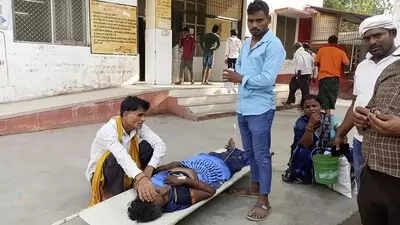Heat alert causes over 100 deaths in three states; delayed monsoon in UP

The last three days have seen dozens of deaths from exposure to extreme heat in at least three states, including Uttar Pradesh, Bihar, and Odisha. Separately, meteorological officials have issued warnings that severe heatwaves will persist across much of the country.
A district hospital in Ballia, Uttar Pradesh, recorded at least 83 fatalities since June 11; 44–54 of these are thought to be cases where pre-existing conditions turned deadly due to the extreme heat and humidity. The majority of these deaths have been reported from Uttar Pradesh and Bihar.
Chhattisgarh government extends summer break for students to June 26 due to heat wave
According to the India Meteorological Department (IMD), the monsoon rains that were previously predicted to arrive in the eastern area on Sunday are now projected to arrive after June 20.
The death toll from the heat is 45 in Bihar and one in Odisha as of Sunday, according to unconfirmed reports.
Dr. SK Yadav, the chief medical superintendent (in-charge) at the Ballia hospital, stated that 23 people died on June 15 out of the 154 patients in that day. The district hospital received 137 new patients the following day (June 16), and 20 people passed away. On June 17, there were 11 fatalities at the hospital.
inhabit one of these ten states? Do not anticipate any relief from the heat.
Meanwhile, a report issued on Sunday to Ballia district magistrate Ravindra Kumar by chief medical officer Jayant Kumar put the total number of fatalities during that time at 83. Yet the report didn't say if the deaths were brought on by hyperthermia or symptoms associated with it.
The report stated that 39 deaths were brought on by various illnesses and medical complications, while 44 deaths were brought on by fever and other medical issues.
The fatalities demonstrate the necessity for developing and carrying out extensive heat action plans in a time when summers are only going to get hotter. Hospitals and medical professionals will need to be on the lookout for illnesses brought on by the heat, and authorities will need to be extra vigilant and aware.
Earlier this week, the hospital released a statement that read: "Under such weather conditions, the problem becomes more for the patients suffering from diseases like blood pressure and bronchial asthma, as these disorders intensify... The majority of the victims complained of giddiness when they were brought in, while some others had fever. Heatstroke was not the cause of these deaths; instead, it was serious illnesses.
Fever and disorientation are undoubtedly two of the most typical symptoms of hyperthermia.
Dr. Diwakar Singh, the chief medical superintendent of Ballia, issued the statement. He was transferred out of the district late on Saturday, though it is yet unknown why.
A state government official stated on Sunday that a two-person investigation team including directors for communicable diseases and treatment, Dr. SK Singh and Dr. KN Tiwari, had been dispatched to Ballia to look into the high death toll. The team examined the responses of medical personnel and analysed water samples from the area to see whether an infection was the cause of the deaths.
.png)